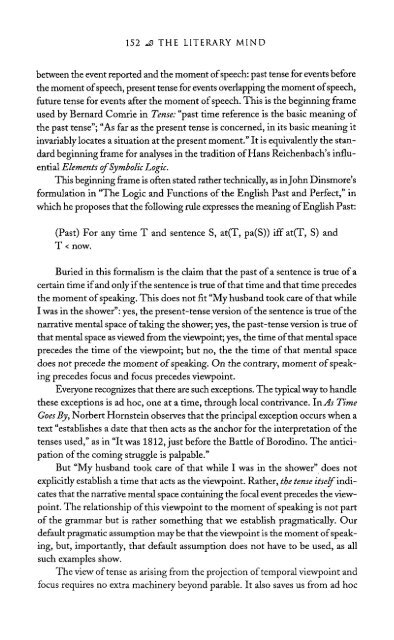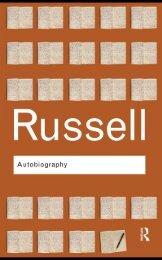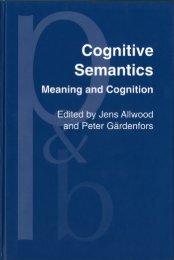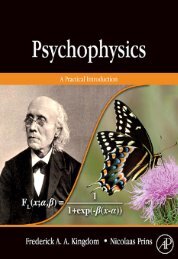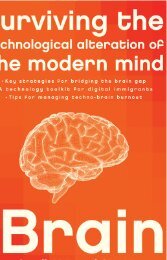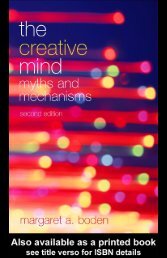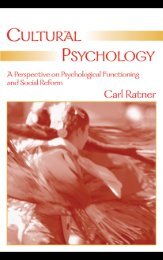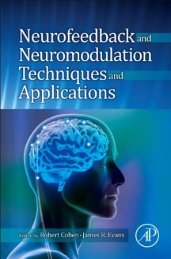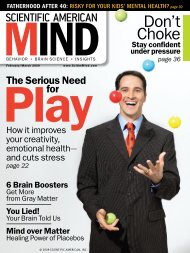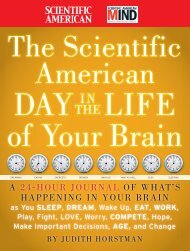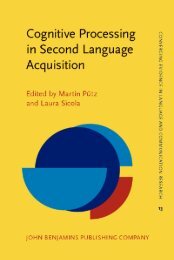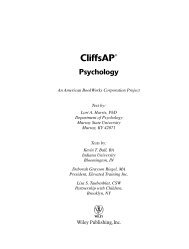The Literary Mind.pdf
The Literary Mind.pdf
The Literary Mind.pdf
Create successful ePaper yourself
Turn your PDF publications into a flip-book with our unique Google optimized e-Paper software.
152 THE LITERARY MIND<br />
between the event reported and the moment of speech: past tense for events before<br />
the moment of speech, present tense for events overlapping the moment of speech,<br />
future tense for events after the moment of speech. This is the beginning frame<br />
used by Bernard Comrie in Tense: "past time reference is the basic meaning of<br />
the past tense"; "As far as the present tense is concerned, in its basic meaning it<br />
invariably locates a situation at the present moment." It is equivalently the standard<br />
beginning frame for analyses in the tradition of Hans Reichenbach's influential<br />
Elements of Symbolic Logic.<br />
This beginning frame is often stated rather technically, as in John Dinsmore's<br />
formulation in "<strong>The</strong> Logic and Functions of the English Past and Perfect," in<br />
which he proposes that the following rule expresses the meaning of English Past:<br />
(Past) For any time T and sentence S, at(T, pa(S)) iff at(T, S) and<br />
T < now.<br />
Buried in this formalism is the claim that the past of a sentence is true of a<br />
certain time if and only if the sentence is true of that time and that time precedes<br />
the moment of speaking. This does not fit "My husband took care of that while<br />
I was in the shower": yes, the present-tense version of the sentence is true of the<br />
narrative mental space of taking the shower; yes, the past-tense version is true of<br />
that mental space as viewed from the viewpoint; yes, the time of that mental space<br />
precedes the time of the viewpoint; but no, the the time of that mental space<br />
does not precede the moment of speaking. On the contrary, moment of speaking<br />
precedes focus and focus precedes viewpoint.<br />
Everyone recognizes that there are such exceptions. <strong>The</strong> typical way to handle<br />
these exceptions is ad hoc, one at a time, through local contrivance. In As Time<br />
Goes By, Norbert Hornstein observes that the principal exception occurs when a<br />
text "establishes a date that then acts as the anchor for the interpretation of the<br />
tenses used," as in "It was 1812, just before the Battle of Borodino. <strong>The</strong> anticipation<br />
of the coming struggle is palpable."<br />
But "My husband took care of that while I was in the shower" does not<br />
explicitly establish a time that acts as the viewpoint. Rather, the tense itself indicates<br />
that the narrative mental space containing the focal event precedes the viewpoint.<br />
<strong>The</strong> relationship of this viewpoint to the moment of speaking is not part<br />
of the grammar but is rather something that we establish pragmatically. Our<br />
default pragmatic assumption may be that the viewpoint is the moment of speaking,<br />
but, importantly, that default assumption does not have to be used, as all<br />
such examples show.<br />
<strong>The</strong> view of tense as arising from the projection of temporal viewpoint and<br />
focus requires no extra machinery beyond parable. It also saves us from ad hoc


